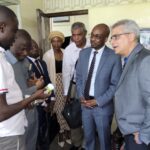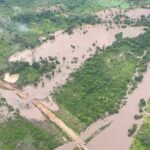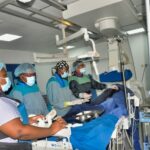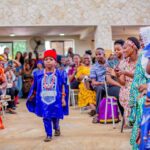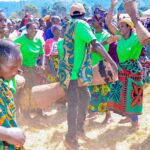In a notable gesture, Mrs. Subisya Kabuje, the Assistant Director of Social Welfare Services at the Office of the President-TAMISEMI, recently visited the clinic for people with skin conditions and disabilities at Maweni Hospital. This visit was intended to demonstrate the Tanzanian government’s commitment to improving health and social welfare. In her capacity as representative of the Tanzanian Deputy Secretary General responsible for Health, Nutrition, and Social Welfare Services, Mrs. Kabuje’s visit served to illustrate the government’s ongoing commitment to the enhancement of healthcare services and the assurance of support for vulnerable populations.
A Focus on Vulnerable Populations
Maweni Hospital, situated in the Kigoma region, has long been a source of hope for individuals afflicted with a range of dermatological conditions and disabilities. The hospital’s clinic has been specifically designed to cater to these patients, providing specialised care and treatment that is often unavailable in other parts of the country. Mrs. Kabuje’s visit was not merely a routine inspection; it was a clear indication of the government’s commitment to enhancing the quality of life for all Tanzanians, particularly those who are most vulnerable.
Government’s Role in Health and Social Welfare
During her visit, Mrs. Kabuje provided a series of instructions with the objective of optimising the clinic’s operational procedures and guaranteeing that patients receive the highest standard of care.

She underscored the necessity of sustained collaboration between the government and a diverse array of stakeholders, including non-governmental organisations, healthcare providers, and the broader community. This collaborative approach is vital for reaching those in need at the community level and ensuring that no individual is left behind.
Enhancing Healthcare Services
One of the principal objectives of Mrs. Kabuje’s visit was to emphasise the necessity for enhancements to the infrastructure and resources available at the clinic. She emphasised the necessity of ensuring that medical personnel are adequately trained, that medical supplies are sufficient, and that equipment is modernised in order to facilitate effective diagnosis and treatment of patients. The government has pledged its commitment to investing in these areas, with the objective of ensuring the continued provision of high-quality care at the clinic.
Training and Capacity Building
In addition to improvements in infrastructure, Mrs. Kabuje emphasised the significance of training and capacity building for healthcare professionals. She highlighted the importance of continuous professional development for medical personnel, noting that it is crucial for them to remain up-to-date with the latest advancements in medical science and treatment protocols. The government, she stated, will persist in providing support for training programmes and workshops with the objective of enhancing the skills and knowledge of healthcare workers, thereby enabling them to provide superior care to patients.
Community Engagement and Awareness
Furthermore, Mrs. Kabuje emphasised the significance of community involvement and awareness in addressing health and social welfare concerns. She highlighted that individuals with skin conditions and disabilities frequently encounter stigma and discrimination, which can impede their ability to access the care they require. The government’s objective is to reduce stigma and encourage greater utilisation of healthcare services by raising awareness and educating the community about these conditions.
Collaboration with Stakeholders
Furthermore, the visit emphasised the pivotal role of stakeholders in facilitating the government’s endeavours to enhance health and social welfare services. Mrs. Kabuje urged non-governmental organisations, private sector partners, and international agencies to maintain their support and collaboration with the government. She underscored the necessity of a multi-sectoral approach for effectively addressing the intricate challenges confronting individuals with skin conditions and disabilities.
Success Stories and Challenges
During her visit, Mrs. Kabuje was afforded the opportunity to engage in direct interaction with patients, through which she was able to gain insight into their experiences. A significant number of patients conveyed their appreciation for the care and assistance they have received at the clinic. However, there were also accounts of obstacles and difficulties encountered by patients, particularly in regard to accessing care and treatment. Mrs. Kabuje acknowledged the challenges and reassured patients that the government is committed to addressing them.
Future Plans and Initiatives
In her forward-thinking address, Mrs. Kabuje set forth a series of prospective plans and initiatives with the objective of enhancing the quality of health and social welfare services in Tanzania. These include the following:
-
Expanding the reach of healthcare services to remote and underserved areas.
-
Increasing funding for health and social welfare programs.
-
Strengthening partnerships with stakeholders.
-
Introducing new programs and initiatives to support people with skin conditions and disabilities, including rehabilitation services, vocational training, and social support programs.
In conclusion, the visit of Mrs. Subisya Kabuje to the clinic for people with skin conditions and disabilities at Maweni Hospital represented a significant event, demonstrating the Tanzanian government’s commitment to health and social welfare. Her emphasis on the necessity of continued cooperation with stakeholders, the improvement of infrastructure and resources, the training and capacity building of personnel, the engagement of the community, and the resolution of challenges faced by patients serves to illustrate the government’s dedication to the enhancement of the quality of life for all Tanzanians, particularly those who are most vulnerable.
Tanzania Media
- Kanyala Ferry Launch: TEMESA’s New Service for 15,000 Sengerema Residents (Mwanza) - 18 August 2025
- Russia-Tanzania Naval Cooperation: How the Smolny Training Ship Boosts Dar es Salaam’s Maritime Security - 18 August 2025
- Tanzania’s ICGLR Commitment: Stabilising the DRC & Great Lakes Region - 18 August 2025









